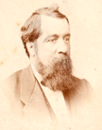James Hingston was born in London to John Hingston (cabinet maker) and Sarah Hingston. His older brother Edward Peron Hingston was a friend and editor of the American writer Charles Farrar Browne. As a teenager, Hingston performed menial office work, before gaining employment in an attorney’s office and also working in a newspaper office at night.
In 1852, Hingston emigrated to Melbourne aboard the Cleopatra, where he pegged a claim at the Mount Alexander gold diggings. After nine relatively unsuccessful months at the gold field, he returned to Melbourne where he set up a law firm and patent agency in Chancery Lane which he operated until his death. One contributor to the Table Talk newspaper described him as the 'father of that well known legal quarter.' Gaining a reputation as a conscientious businessman and legal practitioner, he was appointed as a Notary Public in 1973. Hingston also proved to be a wise investor, taking advantage of the economic boom of 'marvellous Melbourne' in the 1880s, during which he became the largest owner of Melbourne Tramway shares. Hingston never married, and lived by himself at the George Hotel in St. Kilda for over 30 years, until his death on 7 March 1902 while on a sojourn in England. His death was widely reported amongst Melbourne newspapers, who lamented the passing of 'one of the best known citizens of Melbourne for 50 years.' His will bequeathed sizeable donations to several charities and institutions, including a significant sum to the Melbourne Benevolent Asylum.
Despite his prolific professional life, Hingston is best known for his literary efforts as a journalist and travel writer. Drawing from his travels in Asia and the Middle East during the mid-1870s, Hingston contributed a series of travel essays for Melbourne’s Argus newspaper. His essays appeared fortnightly and were published under the initials 'J. H..' Hingston achieved minor literary celebrity status in 1880 with his collected travel writings in two volumes, titled The Australian Abroad on Branches From the Main Routes Round the World, which was republished in a single volume by a Melbourne publisher in 1885. The text reflects the imperialist and orientalist ideology which many Western travel writers displayed at this time. Hingston was concerned with the rise and fall of Eastern civilisations and how the West could maintain advantageous relations with them. He believed, somewhat prophetically, that the loss of the Indian colony would diminish Britain to a second-rate global power. Hingston was also particularly anxious about China, asking 'What is to stop his progress and his dispersal over the world. . . hundreds of millions of Chinese will flood the present [world].' However this rhetoric is tempered in the text by a willingness to criticise the West and its foreign policies. For example, Hingston blamed the 'Indian Mutiny' on the greed and overextension of the British East India Trading Company, and saw the threat of 'Chinese dispersal' as a consequence of internal instability in China resulting from the opium wars and British meddling. He was particularly taken with Japan, which he described as the 'Britain' and 'France' of the East, and encouraged Australians to holiday or immigrate there.
Despite being well known to his contemporaries, Hingston and his seminal text The Australian Abroad have faded into obscurity, with some scholars now finding his absence from Australian literary histories 'insulting' to one of Australia’s pioneering travel writers.
This biography was researched and written by Arjun Rix.
Sources:
“The Late James Hingston, F.R.G.S.” Table Talk, 10 April, 1902. Trove, https://trove.nla.gov.au/newspaper/article/145706471?searchTerm=james%20hingston.
“Obituary: James Hingston.” The Sydney Morning Herald, 12 March, 1902. Trove, https://trove.nla.gov.au/newspaper/article/14434306?searchTerm=james%20hingston.
Walker, David. Anxious Nation: Australia and the rise of Asia 1850-1939. Perth: UWA Publishing, 2012. Informit, https://search.informit.org/doi/epdf/10.3316/informit.0702231312.
Walker, David. “Travellers to the Orient.” Asian Studies Association of Australia Review 12, no. 1 (1988): 12-17. https://doi.org/10.1080/03147538808712534.
Walker, D. R. “James Hingston (1830–1902).” Australian Dictionary of Biography. Last modified 2005. https://adb.anu.edu.au/biography/hingston-james-12983.
 59806481825400376.png
59806481825400376.png